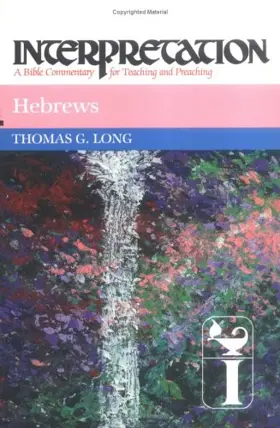

Hebrews
Pages
153
Publisher
Westminster John Knox
Published
1/1/1997
ISBN-13
9780804231336
Collections
This book appears in the following featured collections.
- Commentaries I Would Not Do Without by R. Hansen
Reviews
Like many commentaries in this series, Long's volume on Hebrews is far too short to do justice to the rich theology of the book. Not only is his exposition sparse, but his application comments for preaching and teaching (which is supposed to be the focus of this series) are usually nothing to get excited about. Long seems to be overly focused on the homiletic methods being employed by the author of Hebrews at the expense of theology and exegesis. There are far better commentaries that one could buy for the money.
Hebrews is often identified as a sermon, and this commentary on Hebrews is designed to help expositors give the ancient sermon a new voice from contemporary pulpits. Following the usual format for the Interpretation series, Long treats texts section-by-section rather than verse-by-verse, so that readers can easily see the flow of the discourse. Attention is given to the form and function of the biblical language as well as to its content. For example, noting the cadence of Heb 1:1 when read aloud, Long compares it to the initial line of Lincoln's Gettysburg address. He rightly notes that the language of Hebrews is evocative as well as descriptive; that is, it is designed to evoke that of which it speaks. Hebrews not only speaks about the reality of faith, but is designed to generate faith, much as Franklin Roosevelt sought to mitigate fear and awaken confidence by the rhetorical power of a statement such as "The only thing we have to fear is fear itself." Hebrews was almost certainly not written for individual reading, but to be heard in a congregational setting. Like other good sermons, Hebrews is dialogical, seeking to engage the listeners in active thought by prodding their memories, using "us" and "we" language, asking rhetorical questions, and other devices. As a "word of exhortation" (13:22), Hebrews "finally stands or falls not on its irreducible logic but on its capacity to be the soil in which an event of faith grows in the imaginations of those who read it" (p. 6). We do not so much expect a reader to come to the end of Hebrews saying "That proves it!" but "Amen! I hear this, I see this in the eye of faith, I believe this, I will live this!" (p. 7).
[Full Review]

